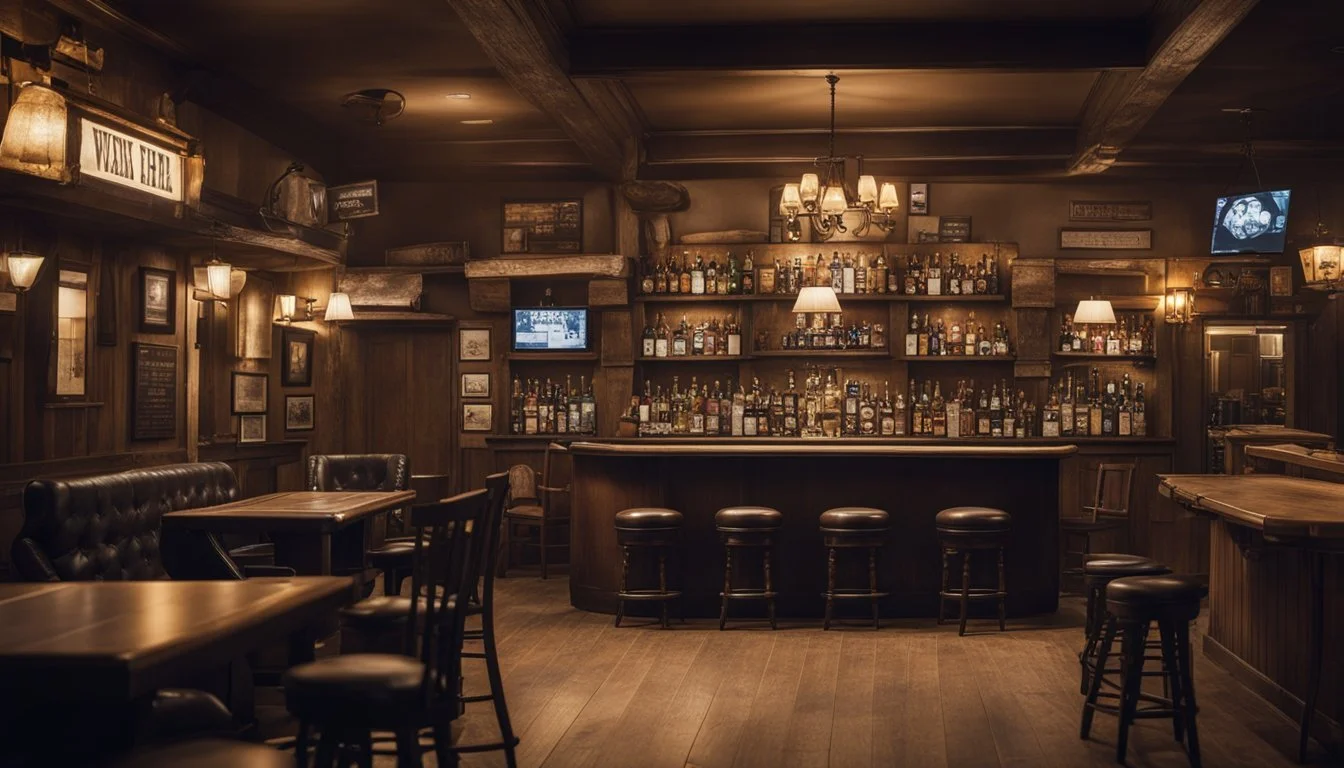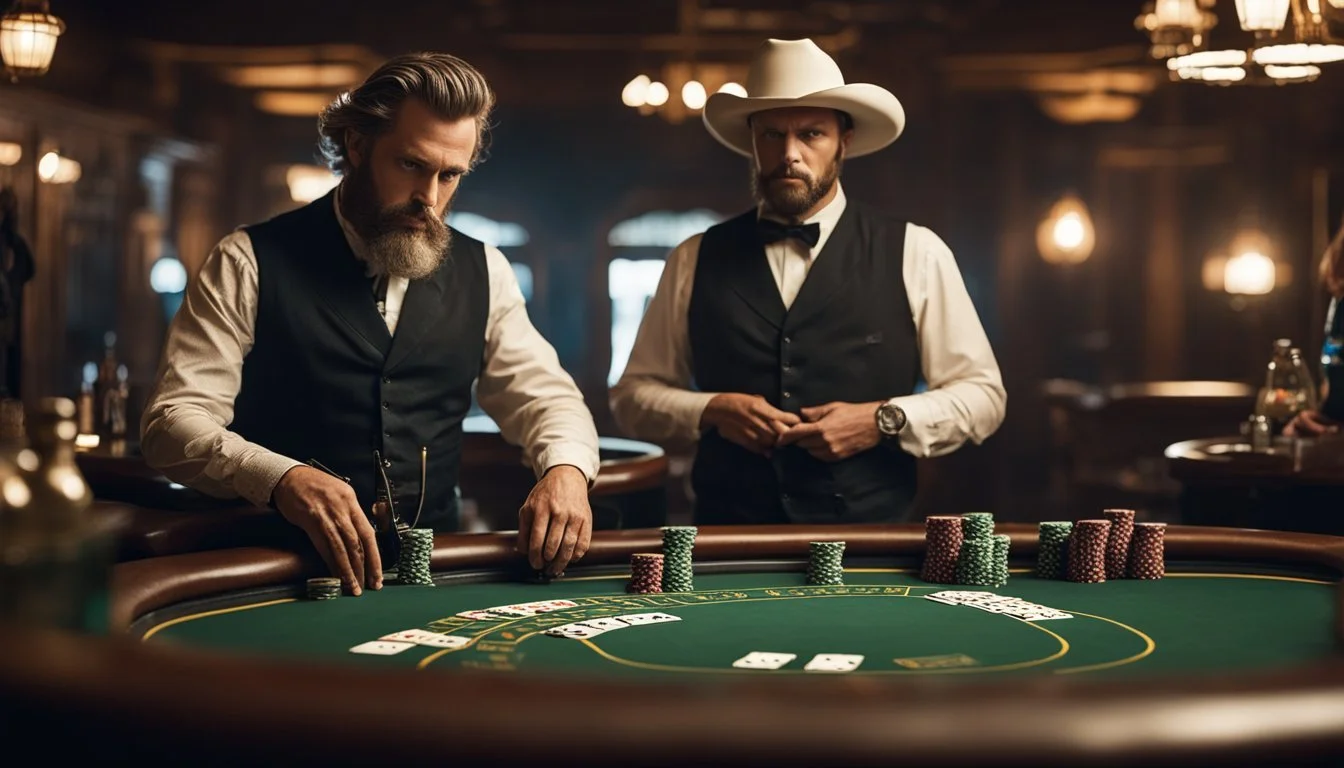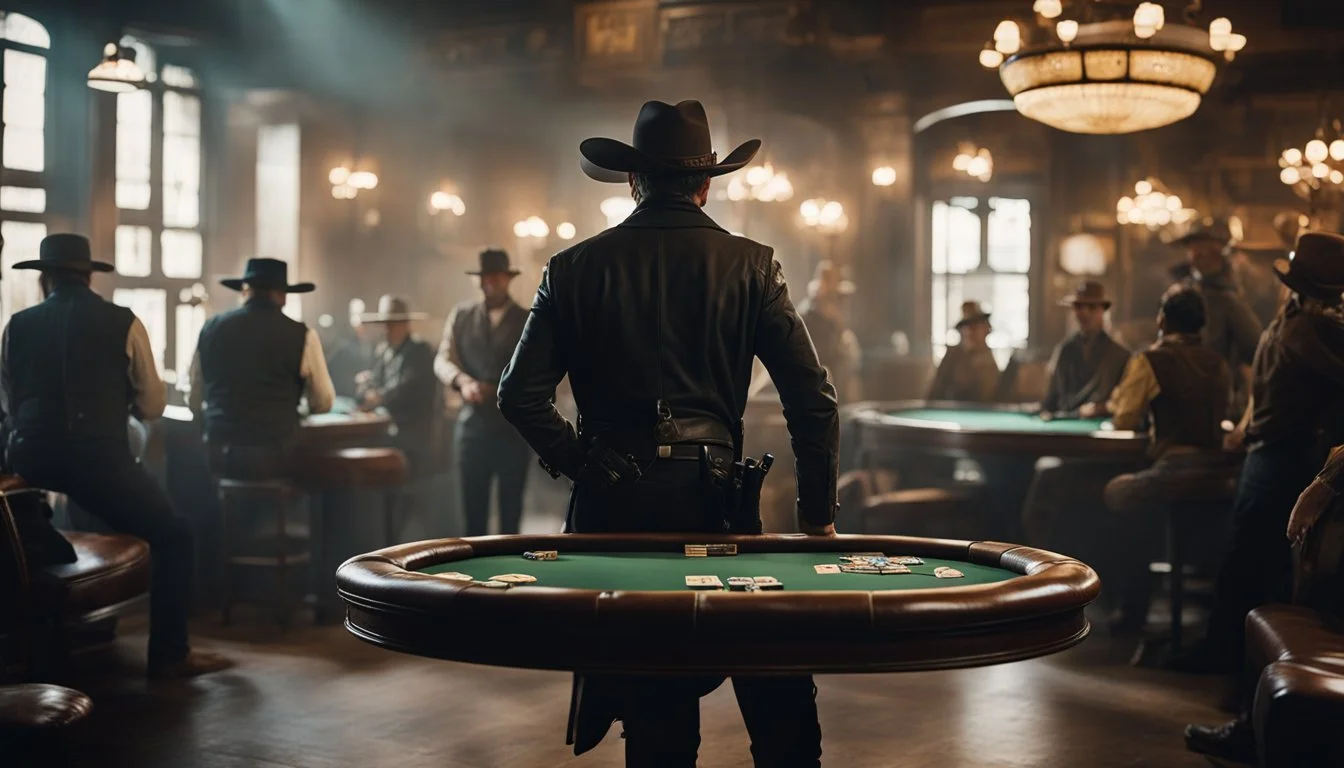4 Insightful Films on Luke Short
Gambler and Gunfighter - Exploring the Wild West Legend's On-Screen Portrayals
Luke Short was a notable figure in the American Old West, known for his skills as a gunfighter, gambler, and businessman. Born in 1854, Short led an eventful life that saw him involved in numerous gunfights and business ventures across frontier towns. His exploits have captured the imagination of many, inspiring various depictions in film and literature.
Four insightful films offer viewers a glimpse into the life and times of Luke Short, exploring his reputation as a skilled marksman and shrewd gambler. These cinematic portrayals provide context for Short's experiences in iconic Western locations like Tombstone, Arizona, and Dodge City, Kansas. By examining these films, audiences can gain a deeper understanding of the complex character that was Luke Short and the era in which he lived.
1) Luke Short: Artist, Gunfighter, Champion (1959)
This Western film portrays the life of Luke Short, a legendary figure of the Old West. It depicts Short's journey from a young cowboy to a skilled gunfighter and successful gambler.
The movie showcases Short's involvement in various gunfights, including his famous confrontations with Charlie Storms in Tombstone and Jim Courtright in Fort Worth. These scenes highlight his quick reflexes and marksmanship.
The film also explores Short's business ventures, particularly his ownership of saloons in Dodge City and Fort Worth. It portrays his relationships with other notable figures of the era, such as Wyatt Earp and Bat Masterson.
While taking some creative liberties, the movie attempts to capture the essence of Luke Short's multifaceted personality. It presents him as a complex character - a gentleman gambler with a deadly reputation.
More information on Luke Short
2) True West: The Luke Short Legacy
Luke Short left an indelible mark on the Wild West. His reputation as a formidable gunfighter and successful gambler made him a legendary figure of the era.
Short's encounters with other famous lawmen and outlaws added to his mystique. He crossed paths with Wyatt Earp, Bat Masterson, and other notable figures of the Old West.
Despite his small stature, Short proved to be a dangerous adversary. He survived several gunfights, including high-profile shootouts with Charlie Storms in Tombstone and Jim Courtright in Fort Worth.
As a businessman, Short owned saloons in bustling frontier towns. He had interests in prominent establishments in Dodge City, Kansas and Fort Worth, Texas.
Short's life embodied the excitement and danger of the American frontier. His story continues to captivate those interested in Wild West history and lore.
While no major films focus solely on Luke Short, his character appears in various Western productions. These depictions help keep his legacy alive in popular culture.
3) The Duel at the Arcade Saloon (1890)
"The Duel at the Arcade Saloon" (1990) depicts Luke Short's infamous confrontation with Charlie Storms in Tombstone, Arizona. The film recreates the tense atmosphere of the Occidental Saloon, where the altercation began.
Short's reputation as a skilled gambler and gunfighter is highlighted as he faces off against the aggressive Storms. The movie portrays the quick escalation of their dispute, which started over a gambling disagreement.
The climactic duel takes place on Allen Street, with Short demonstrating his lightning-fast reflexes. His accurate shot proves fatal for Storms, solidifying Short's status as a formidable gunslinger.
The film explores the aftermath of the shooting, including Short's brief arrest and subsequent release due to self-defense. It also touches on the impact this event had on Short's reputation in Tombstone.
Learn more about Luke Short's life and conflicts
4) The Lawman vs. The Gambler
"The Lawman vs. The Gambler" (1978) explores the tension between Luke Short and lawman Bat Masterson in Dodge City. The film depicts their complex relationship as both allies and adversaries.
Short's gambling empire clashes with Masterson's efforts to maintain order. Their confrontations highlight the fine line between legal and illegal activities in the Old West.
The movie portrays Short as a shrewd businessman who pushes boundaries. Masterson is shown as a principled lawman struggling to enforce rules in a chaotic frontier town.
Key scenes dramatize their standoffs and negotiations. The film captures the political maneuvering behind Dodge City's infamous "peace commission" that involved both men.
"The Lawman vs. The Gambler" offers a nuanced look at the shifting alliances and power dynamics in 1880s Dodge City. It provides insight into how gamblers like Short navigated relationships with law enforcement to protect their interests.
More information on the Dodge City War
Historical Context of Luke Short
Luke Short lived during a tumultuous period in American history, characterized by westward expansion and lawlessness. His life exemplified the archetypical Western gunfighter and gambler of the late 19th century.
Early Life and Background
Luke Short was born on January 22, 1854, in Polk County, Arkansas. He grew up in a time of rapid change and opportunity in the American West. As a young man, Short worked as a cowboy, driving cattle from Texas to Kansas.
This experience exposed him to the rough-and-tumble frontier life. Short's small stature belied his fierce determination and quick temper. These traits would serve him well in his future endeavors as a gambler and gunfighter.
Era of the Wild West
Short's adult life coincided with the height of the Wild West era, spanning from the 1870s to the early 1890s. This period saw the rise of iconic frontier towns like Tombstone, Arizona, and Dodge City, Kansas.
Gambling halls, saloons, and brothels flourished in these boomtowns. Short carved out a niche for himself in this environment, becoming a skilled gambler and businessman. He owned or managed several high-profile saloons, including the Oriental in Tombstone and the White Elephant in Fort Worth.
The era was marked by frequent violence and gunfights. Short participated in several notable shootouts, including confrontations with Charlie Storms and Jim Courtright. These events cemented his reputation as a feared gunman in the Wild West.
Cultural Impact of Luke Short's Story
Luke Short's life as a gambler and gunfighter in the Old West left an indelible mark on American popular culture. His exploits have been romanticized and reimagined in various forms of media, shaping public perceptions of the Wild West era.
Representation in Popular Media
Luke Short's story has been featured in numerous books, films, and television shows. His reputation as a skilled gunman and dapper dresser made him an attractive subject for Western narratives. Short appeared as a character in the TV series "Tombstone Territory" and was portrayed in the film "Tombstone" (1993).
Several authors have written biographical works on Short, including "The Notorious Luke Short" by Jack DeMattos and Chuck Parsons. These accounts have helped keep his legend alive for modern audiences.
Myth vs. Reality
The portrayal of Luke Short in popular culture often emphasizes his gunfighting skills and gambling prowess. While these aspects of his life are based on historical facts, some depictions may exaggerate or simplify his character.
In reality, Short was a complex figure who navigated the dangerous world of frontier towns through a combination of business acumen and personal courage. His involvement in notable conflicts, such as the Dodge City War, has been both celebrated and scrutinized by historians.
The enduring fascination with Luke Short reflects broader cultural interests in the mythology of the American West and its colorful cast of characters.






